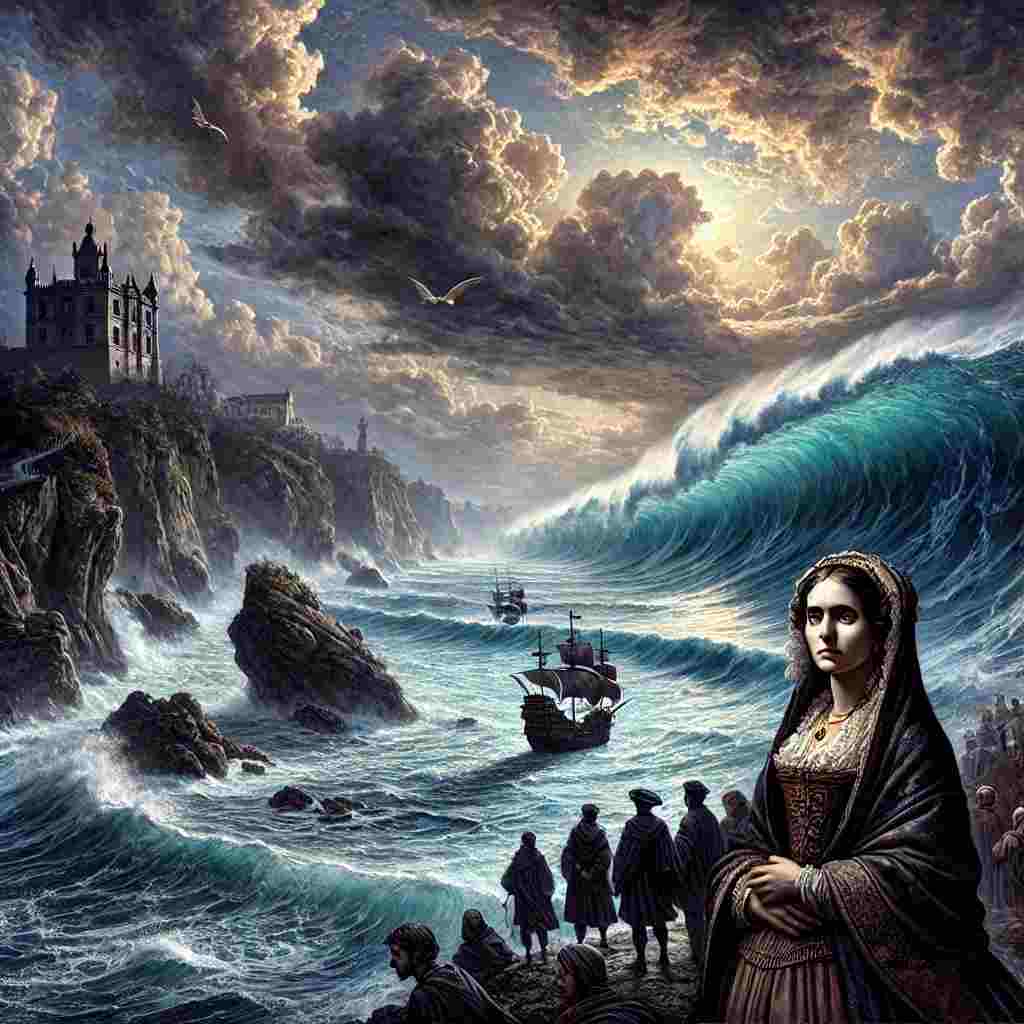Portuguese Sea (Portuguese)
Fernando Pessoa
1888 to 1935

Mar Português
Ó mar salgado, quanto do teu sal
São lágrimas de Portugal!
Por te cruzarmos, quantas mães choraram,
Quantos filhos em vão rezaram!
Quantas noivas ficaram por casar
Para que fosses nosso, ó mar!
Valeu a pena? Tudo vale a pena
Se a alma não é pequena.
Quem quer passar além do Bojador
Tem que passar além da dor.
Deus ao mar o perigo e o abismo deu,
Mas nele é que espelhou o céu.
Fernando Pessoa's Portuguese Sea
Fernando Pessoa’s poem "Portuguese Sea" ("Mar Português" in the original Portuguese) reflects the Portuguese spirit of exploration, as well as the suffering, pride, and resilience connected to the country’s history of seafaring ventures. Through simple but powerful language, Pessoa captures both the cost and the spiritual reward of Portugal’s age of exploration. The poem’s concise structure and poignant phrasing emphasize the complex duality of sacrifice and achievement, drawing on Portuguese cultural identity and metaphysical insights about human ambition and the vastness of the unknown.
Fernando Pessoa wrote *"Portuguese Sea"* under the heteronym **Álvaro de Campos**, one of his most dynamic and expressive personas. Campos, often characterized by his intense emotions and fascination with the modern, technological world, is a poet of extremes—his work oscillates between ecstasy and disillusionment. Unlike some of Pessoa’s other heteronyms, Campos is more outwardly passionate, giving voice to Pessoa’s reflections on Portuguese identity, progress, and the existential burdens tied to ambition and discovery. Campos was heavily influenced by the Futurist movement, yet he also deeply grappled with the heritage of Portugal’s past, especially its Age of Discovery, which resonates strongly in *"Portuguese Sea."* Here, Campos’s voice embodies both admiration and critique, contemplating the sacrifices and spiritual profundities inherent in exploration. Through Campos, Pessoa could explore themes of nationalism, existential striving, and the paradox of human achievement with a sense of fervor and emotional intensity that might not align with his own restrained persona.
Analysis
Stanza 1
"Ó mar salgado, quanto do teu sal
São lágrimas de Portugal!
Por te cruzarmos, quantas mães choraram,
Quantos filhos em vão rezaram!
Quantas noivas ficaram por casar
Para que fosses nosso, ó mar!"
Pessoa opens the poem by addressing the ocean directly as "Ó mar salgado" (O salty sea), a phrase that not only personifies the sea but also emphasizes its bitterness. This “salt” is not merely a natural property of the sea but a metaphorical embodiment of Portugal's collective suffering and loss—"quanto do teu sal / São lágrimas de Portugal!" (how much of your salt / Are the tears of Portugal!). By likening the ocean’s saltiness to the tears of those left behind, Pessoa invokes the emotional toll of Portugal's seafaring past.
The stanza proceeds with an enumeration of these losses: "quantas mães choraram", "quantos filhos em vão rezaram", "quantas noivas ficaram por casar" (how many mothers cried, how many sons prayed in vain, how many brides were left unmarried). Each phrase highlights the collective sacrifice of families who endured separations and losses for the sake of Portugal’s oceanic expeditions. These lines reveal the human cost behind Portugal’s imperial achievements, where individuals’ lives and hopes were often traded for national glory and territorial gain.
The final line, "Para que fosses nosso, ó mar!" (So that you would be ours, O sea!), captures both the historical ambition to “own” the sea and the poignancy of such a desire. In pursuing dominion over the ocean, Portugal’s explorers and their loved ones endured immense suffering. This line encapsulates Pessoa’s meditation on the dichotomy between possession and loss, questioning the value of such gains in the face of immense human cost.
Stanza 2
"Valeu a pena? Tudo vale a pena
Se a alma não é pequena.
Quem quer passar além do Bojador
Tem que passar além da dor."
The second stanza opens with a rhetorical question: "Valeu a pena?" (Was it worth it?). This question reflects a tension that runs throughout the poem, questioning the sacrifices made in the name of exploration and conquest. However, Pessoa answers with a famous, paradoxically affirming line: "Tudo vale a pena / Se a alma não é pequena" (All is worthwhile if the soul is not small). This statement encapsulates a key element of Pessoa’s philosophical outlook: a belief in the nobility of striving, regardless of the suffering it entails, provided the human spirit remains expansive and unyielding.
The following lines, "Quem quer passar além do Bojador / Tem que passar além da dor" (Who wants to go beyond Bojador / Must go beyond pain), refer to Cape Bojador on the west coast of Africa—a geographical and symbolic boundary in Portuguese exploration history. For many years, Cape Bojador represented the feared “edge” of the known world, beyond which lay unknown perils. In this context, Pessoa’s lines emphasize that any venture into the unknown—whether physical, emotional, or spiritual—requires courage and endurance in the face of inevitable suffering. Crossing this threshold involves both literal danger and the metaphorical pain of separation, uncertainty, and potential loss.
Final Lines
"Deus ao mar o perigo e o abismo deu,
Mas nele é que espelhou o céu."
The poem closes with an image rich in spiritual and symbolic meaning: "Deus ao mar o perigo e o abismo deu, / Mas nele é que espelhou o céu" (God gave the sea danger and the abyss, / But in it He mirrored heaven). Here, Pessoa synthesizes the duality of the sea: it is both treacherous (full of peril and the abyss) and transcendent (a mirror of heaven). This closing metaphor unites the elements of risk and spiritual aspiration, suggesting that human endeavors into the unknown are fundamentally divine. The sea is a medium through which humanity can glimpse the “heaven” of existential purpose and transcendence.
The image of the sea as a reflection of the heavens offers an insightful reconciliation between human struggle and spiritual fulfillment. In enduring the dangers and depths of the sea, Pessoa implies, humanity may come closer to a kind of celestial understanding or enlightenment. This encapsulates the idea that ultimate meaning or beauty is inseparable from risk and suffering—a fitting end to a poem that meditates on the price of greatness.
Conclusion
In "Portuguese Sea," Pessoa captures the Portuguese spirit of exploration, which is marked by both pride and sorrow. By combining simple language with profound ideas, he evokes the sea as a symbol of Portugal’s past glory and its accompanying sorrows. Through vivid metaphors and allusions, the poem portrays the ocean as a space of both existential peril and divine beauty, emphasizing the complex intersection of human ambition and sacrifice. Pessoa’s ultimate message is one of transcendence: although the sea demands sacrifices, it also offers a path to spiritual grandeur for those whose souls are expansive enough to endure its trials. This notion—that life’s most daunting challenges yield its most profound rewards—resonates not only with Portugal’s historical identity but also with universal human experience.
This text was generated by AI and is for reference only. Learn more
Want to join the discussion? Reopen or create a unique username to comment. No personal details required!



Comments
No comments yet. Be the first to comment!